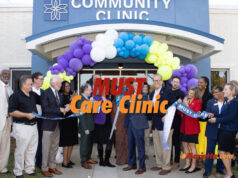According to the AARP, nearly 3 in 4 women who seek help for significant menopause-related symptoms are left untreated. Often, their symptoms are described as “normal” and “something you just need to get used to.”
Marietta-based Nore Women’s Health (pronounced Nor-ay) is about to change that for women in Georgia.
“Nore is a safe haven where women can come to be listened to and treated, not dismissed,” said Heather Quaile, DNP, a board-certified women’s health nurse practitioner. “We talk about their most intimate issues related to perimenopause, menopause, sexual dysfunction, and urinary concerns.”
Quaile said that women who visit Nore are relieved knowing there’s something they can do to improve quality of life. “My visit was completed with care, compassion, knowledge, and professionalism,” said Mary Selbitschka, who came to Nore from Gainesville, Georgia. “I drove 60 miles looking for someone to listen to me and treat me as a whole person. I left very happy!”
This is one of more than 50 reviews Nore received online in the first few months after opening.
Nore’s inspiration
The innovative business model was inspired by the medical practice of its founder, Dr. Robert Harris, who also serves as Nore’s medical director. A respected urogynecologist with more than 20 years of experience, Dr. Harris specializes in female pelvic medicine and reconstructive surgery in Jackson, Mississippi. His patients repeatedly complained about having menopause-related symptoms that were dismissed or ignored by other providers. The tipping point came when his wife, Myriam, began to experience hot flashes and irritability.
One of Dr. Harris’ long-time nurse practitioners, Mickie Autrey, began trialing new hormone replacement therapies for herself, for Myriam, and for select patients. They had incredible results and decided to open a separate location where they could treat menopause patients full time. Eventually, the group expanded services to include emerging treatments like non-surgical vaginal rejuvenation and laser therapy. They address menopause symptoms like vaginal dryness and laxity, which cause women to struggle to maintain sexual intimacy.
Nore’s unique DNA
Nore’s founders quickly realized the opportunity to bring the concept here to help women in Georgia. The first Nore location opened in a West Cobb retail center off Dallas Highway. The company plans to open more locations across metro Atlanta.
The team designed the office to be a safe, bright, and pleasant place to discuss intimate topics. “We have a consultation room where we meet our patients for the first time, instead of meeting them in an exam room, where they would be undressed and vulnerable,” said Julie Morin, a board-certified women’s health nurse practitioner who runs the practice with Quaile. “We always talk to them fully clothed in our offices. They can see photos of our families. It helps decrease the anxiety surrounding the topics that are going to be discussed. We want to have a relationship with each patient, so she trusts that we’re going to help her.”
From the beginning, Nore has strived to develop a local community focus. “We wanted to do this thing the right way, to have the absolute best for women,” said Dr. Harris.
He said it was essential that patients were cared for by nurse practitioners from within the community. Both nurse practitioners live just a few miles from Nore. The West Cobb location was selected to fit them, so they could serve friends and neighbors in their home community.
Morin came to Nore after serving patients in a fertility clinic in Marietta. She has lived in the community for many years and earned one of her degrees at Kennesaw State University. An active mom, Morin often sees her patients at school and community events.
“We’re women caring for women,” said Quaile, who has been a women’s health nurse practitioner for 18 years. She has served women who are preparing to give birth, as well as women undergoing treatment for breast cancer. She also taught nursing clinicals at Kennesaw State University and has helped perform sexual assault exams for Cobb County through LiveSafe Resources.
“I feel empowered to help women who are seeking answers and feeling unheard,” Quaile said.
Menopause and the need to feel normal
It’s not abnormal for women in their 40s, 50s, and 60s to experience hot flashes, irritability, low libido, and sleepless nights. But with many treatments available, they shouldn’t have to suffer. Unfortunately, the two nurse practitioners hear from patients daily who have struggled for years. The patients say they feel crazy, out of control, and even inhuman. They aren’t able to find treatment options outside of commonly prescribed anti-depressants, which many women find off-putting.
“I have a patient that’s not insured,” Quaile said. “She said, ‘I’m a mom, and I work, and I’m a wife and I feel miserable. I’m not a complainer. I have mental fog. I’m hot and I can’t sleep. I’m taking a financial risk coming here, but I just want to feel better.’”
Quaile spent time discussing her symptoms and drew blood to analyze her numbers. She pointed out that while the patient’s values were technically in the normal range, she was on the lower end and could benefit from therapies to treat her symptoms. At Nore, she received one-on-one attention and a personalized treatment plan. “We helped her understand that menopause is a process that can begin as early as your thirties and can begin with symptoms that may not be reflected directly in lab findings,” Quaile said.
After six weeks of hormone therapy, the patient came back for a lab check, saying, “I never imagined in a million years that I’d be feeling so much better.”
Before beginning any patient on hormone therapy, the team at Nore takes a full medical history, including a family history, personal history of cancer, PAP smear results, mammography results, and other pertinent medical data. “We talk about hormonal changes that could be causing some of the symptoms,” Morin said. “But we also look at cortisol, thyroid, Vitamin D, estrogen, testosterone, and other labs. Our goal is to find out what’s wrong and treat. Most insurance will cover these blood tests. I feel really strongly about utilizing the patient’s benefits when possible.”
When menopause is the issue, patients typically start with hormone creams or lozenges. Once a patient is feeling better and the correct dosage has been identified, the patient is presented with the option to try pellet therapy. Pellets are rice grain-sized medications that are implanted underneath the skin and typically last for 3-4 months.
Sex after menopause or cancer
While many women come to Nore to deal with fatigue, urinary incontinence, hot flashes, and other symptoms of menopause, others ask for help when their marriages suffer. These patients often have a lack of sexual desire or painful intercourse and have often not been presented with solutions. They typically feel alone.
Morin is quick to tell patients they are not alone. At least half of all women will experience sexual dysfunction at some time during life, and this is even more prevalent during peri-menopause and menopause. Sexual issues also are common in women who have undergone cancer treatment. Nore offers several options beyond hormone therapy for these patients.
The MonaLisa Touch vaginal laser can stimulate new collagen production and help to rejuvenate tissue elasticity and rehydrate the lining of the vagina. This CO2 laser treatment is designed to restore vaginal function and alleviate burning, itching, and dryness. This painless in-office procedure can be completed in five minutes.
Morin said she recently performed such a treatment on a breast cancer survivor. “She was not able to have intercourse with her husband because of vaginal dryness and pain,” Morin said. “They’ve always been very active together. Her husband wanted to give me a hug for giving her hope. He wasn’t resentful, but subconsciously, the lack of intimacy was affecting their relationship.”
Other treatments that benefit patients are ThermiVa and O-Shot. ThermiVa is a non-surgical procedure using radiofrequency heat that can tighten the vagina and stimulate collagen production. Vaginal laxity can occur after childbirth and may worsen with aging. The O-Shot is an injection of the patient’s own platelet rich plasma to stimulate vaginal stem cells, leading to healthier, more sensitive tissue. O-Shot can help with orgasmic function. Both treatments can improve mild urinary incontinence.
Whichever treatment is right for a patient, the nurses at Nore want to help return a sense of normalcy and intimacy to women’s minds and bodies. And they try to do it in a cost-effective manner. While some of the services and procedures are not covered by insurance, the practice accepts most private insurance plans, which cover office visits, labs, and some hormone therapy treatments.
“Our mission is to help each woman be her most, and enjoy this amazing stage of life,” Morin said.
Resource:
Wolff, Jennifer. What doctors don’t know about menopause: three out of four women who seek help for symptoms don’t receive it. (2018, August/September) Retrieved from AARP magazine: https://bit.ly/2PiO36f
















